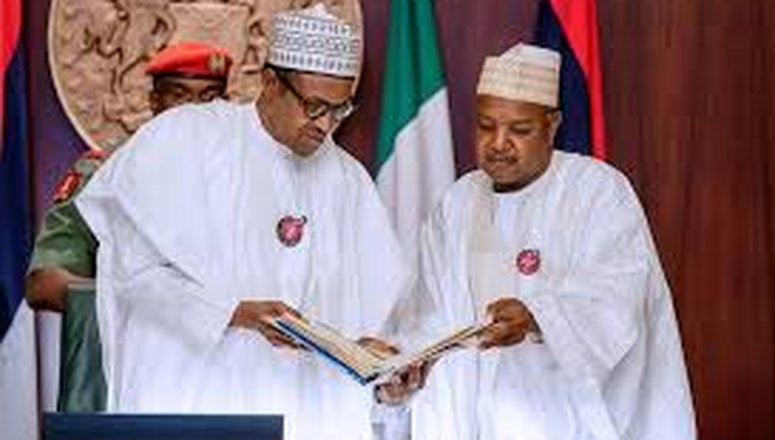There are indications that the plan by President Muhammadu Buhari’s government to pay Kebbi State Governor, Abubakar Bagudu $100 million from Abacha loot, may hamper future cooperation between Nigeria and the United States.
According to court documents cited by Bloomberg, Bagudu, a close political ally of the president, was part of a network controlled by former military dictator, Gen. Sani Abacha that “embezzled, misappropriated and extorted billions from the government of Nigeria” from 1993-1998.
The Nigerian government recently signed an agreement with the US and the British crown dependency of Jersey to repatriate $308m funds connected to former Nigerian military ruler.
The chairman of the powerful APC Governors’ forum was indicted by the US government for using phoney companies to siphon and move stolen funds across transnational borders during the reign of Abacha.
Gov Bagudu has vehemently denied any wrongdoing and told Daily Trust that the whole story was “planned by the US government in its efforts to confiscate the money”.
“I signed an agreement with the Nigerian government in 2003 and I never admitted to any criminal offense, and the money in question is in the UK not the US and is legitimate,” he added.
‘Buhari’s reputation at stake’
Some analysts see this as a serious set back to Nigeria’s efforts to repatriate the stolen funds and questioned President Buhari’s commitment to the fight against corruption.
According to documents from the U.S. Department of Justice, Bagudu spent six months in federal detention in Texas in 2003 while awaiting extradition to the Island of Jersey.
However, before he was handed over to criminal trial in Jersey, he quickly agreed to return $163m to Nigeria and was released on bond to Nigerian authorities.
Bagudu returned to Nigeria and was elected senator in 2009. In 2015, he became the governor of Kebbi state, winning his re-election bid in 2019.
Buhari’s spokesperson, Garba Shehu, in a text message, said Nigeria has a lot more money to recover oversees and no one has the right to complicate things for the government.
He added that the $308m agreed to be returned to Nigeria from Abacha loot will be “paid to the Nigerian Sovereign Investment Authority, NSIA and will be used in expediting the construction of the three major infrastructure projects across Nigeria – namely Lagos – Ibadan Expressway, Abuja – Kano Expressway and the Second Niger bridge”.
He, however, failed to confirm or deny the report that the government has agreed to pay Bagudu $100m from the money.
The US Department of Justice also contends that the Nigerian government is hindering its efforts to recover allegedly laundered money it says it’s traced to Bagudu.
Bagudu signs agreement with govt
The Buhari administration says a 17-year-old agreement entitles Bagudu to the funds and prevents Nigeria from assisting the U.S., according to recent filings from the District Court for the District of Columbia in Washington quoted by Bloomberg.
“This case illustrates how complex and contentious repatriating stolen assets to Nigeria can be,” said Matthew Page, an associate fellow at London-based Chatham House and former Nigeria expert for U.S. intelligence agencies, according to the report.
“Instead of welcoming U.S. efforts, Nigeria’s lawyers appear to be supporting the interests of one of the country’s most powerful families.”
In the case involving Bagudu, the U.S. in 2013 initiated a forfeiture action against a host of assets, including four investment portfolios held in London in trust for him and his family, according to the district court filings.
Despite the forfeiture action being initiated following a Nigerian state request in 2012, Buhari’s government now says it can’t assist the U.S. because it’s bound by a settlement Bagudu reached with the administration of then-President Olusegun Obasanjo in 2003, according to the court filings.
Under the terms of that accord, which was approved by a U.K. court, Bagudu returned $163 million of allegedly laundered money to the Nigerian authorities, which in exchange dropped all outstanding civil and criminal claims against him “stemming from his involvement in government corruption,” according to a Dec. 23 memorandum opinion by District Judge John D. Bates in Washington D.C.
That meant “Nigeria renounced any interest whatsoever” in Bagudu’s trust assets, including those the U.S. is attempting to recover for the West African nation, the opinion stated.
After Bagudu successfully sued Nigeria for violating the 2003 settlement, Buhari’s administration reached a new agreement with him in October 2018, according to the court filings. That would result in the transfer of ownership of the investment portfolios, worth 141 million euros ($155 million) to the Nigerian state, which would then pay 98.5 million euros to Bagudu and his affiliates, according to Bates’ Dec. 23 opinion.
The funds are currently restrained by the U.K. at the request of the U.S.
Nigeria’s government claims the updated 2018 agreement with the Kebbi governor, which requires court approval in the U.K., will “curtail and mitigate its looming exposure” from the judgment in Bagudu’s favor.
Buhari’s administration submitted the 2018 deal to the U.K. court in September to support its application to unfreeze the assets so they can be sent to Nigeria, according to the opinion. The court has yet to make a decision.
Successive Nigerian governments have sought to recoup the money looted by Abacha, who died in office, and have so far repatriated more than $2 billion with the cooperation of other countries, according to U.S. court filings.
Editor’s Note: This story has been updated with Governor Bagudu and Garba Shehu’s reactions.

 Join Daily Trust WhatsApp Community For Quick Access To News and Happenings Around You.
Join Daily Trust WhatsApp Community For Quick Access To News and Happenings Around You.

